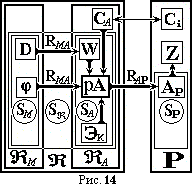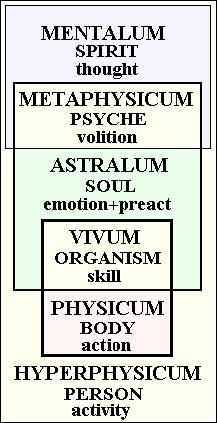5.1. AWKWARDNESS and VOLITIONLESS
è
In order to fulfil an action A it can be not enough a desire, intention j and even an already ready/fulfilled PREACT pA. Sometimes a person cannot fulfill A though others can do it and, under other circumstances, he himself can do it too. Such a failure (breakdown) can be caused by several
reasons which don't exclude each other.
• A breakdown (full or even partial one) of reflection RÀP (fig. 14), a breach of connection of astrosoma SÀ (or psyche SÂ as the whole) with physical body SP, reveals as loss of dexterity, as appearance of awkwardness, despite of physiological full value of SP. For example, it can reveal itsself as stutter, inability to make a picture and/or to execute some other thin manipulation, inability to reproduce a melody, despite of presence of ear for music, as stumble on a flat place. It is a breakdown at an organism SV level. The breakdown can both to hinder from realization by body SP of PREACT pA, which is already an element of SÀ, and initially to hinder from pA formation.
| |  |
• At the level of S psyche SÂ, unlike SV, there are possible two, not excluding each other, mechanisms of volitionless, or refusal of volition, refusal of reflection RMÀ, of disturbance of norm of hierarchical attitudes of individual mentalum SM with astrosoma SÀ.
(1) Performance of action A is induced/prompted not only by intention j,
but can also be induced or braked by numerous of emotions Эi and of external (physical) stimulus Ci. Therefore, if among Эi of a person/subject S, an emotions ЭÊ competitive to the intention j grows, braking of PREACT pA realization, of action A fulfillment, so j can remain not realized (for example, fear can become such ЭÊ)
(2) Intention j can consist in refraining from performance of undesirable action AK, PREACT pAK of which is already available in astrosoma SÀ , to prevent it. If such an undesirable pAK grows spontaneously, independently of mentalum SM, of intention j, or even contrary to j - it is also a breakdown of reflection RMÀ, its spontaneous realization, an impulse.
At the organism level the analogous (2) mechanism of reflection RÀP breakdown is excluded: a body SP cannot move spontaneously, without prompting from astrosoma SÀ .
Realization of an impulse can, in its turn, be spontaneous, it is a jerk. So a dog jerks/strains at a chain, despite of uselessness of this action A.
Presence of emotion ЭÊ, competitive to intention j, is not fatal to realization j. Definite enough person's S thought-determination D can both
• to induce (reflection R'MÀ in the fig. 14) emotion W, stronger than ЭK ((emotion, competitive to the competitive one – ЭÊ2), and consequently capable to make pA
active. Such starting emotion, an astral fuse for PREACT pA, readiness W (fig. 13à) is such a state of astrosoma SÀ when to refuse from performance of action A is already more difficultly, than to execute it, and
• and to suppress an undesirable impulse, to prevent its realization through jerk AK.
Moreover, astrosoma SÀ can contain moulded/valid PREACTS of quite opposite orientated actions. Even kittens, in their children's games, perfect/train simultaneously/in parallel PREACTS of attack and defence, of pursuit and flight. To begin performance of a necessary, desirable action A (realization/embodiment of necessary PREACT pA), corresponding to own common sense, to intention j, the corresponding starting/launching impulse, readiness W is also necessary.
Breakdowns are possible also at other levels of a person S. These breakdowns are not connected with reflections (as with inter-hyper-substantial attitudes).
• If an action A is realized for the first time, when PREACT pA doesn't still exist, is still only should be created, but intention j is not powerful enough in order to induce it, it is a breakdown at the spirit SÌ level.
• If in connection with the certain event, circumstance, or situation, and even without any explainable reasons, a person is out of form, down in the dumps, suffers – such a state can be admitted as an undesirable emotion of the second order, an anguish – as spontaneous (breakdown!) reflection RÀÀ within the bounds of soul SÀ (like spontaneous beginning of ЭÊ) – reflection of discontent with lack of positive emotions (of the first order). An anguish can reveal itself – already on the basis of RÀP, at the organism level, in behaviour – as apathy.
| | 
|
• If physical abilities of body SP are below than necessary for performance A, so intention j remains not realized.
If a pianist has his hand in a plaster he will not execute a masterly play, no matter how its intention was strong, and however its PREACT pA was powerful, however well play has been rehearsed by him (before, when the hand has still not been damaged). Will is will, if power's great deal...
It is possible to distinguish:
• Primordial involition is absence of PREACT pA , adequate to intention j.
• Primordial indecision is absence of Wreadiness W, adequate to intention j.
• Competitive (or competitively-caused) involition is result of struggle of two (or greater number) PREACTS pA and/or emotions Э for realization, embodiment into physical sphere.
At that feedbacks can work: at negative emotions, at occurrence or expectation of difficulties (real or even imaginary) initial intention varies, compromises, (self)-justifications and excuses for delays of intention execution, for full its change or refusal of it are searched and found. We'll explain it with an example from a household life.
| |
In the evening somebody Mr. Dry thinks: it's a simple matter – in the morning I'll take at once a cold shower and rub myself with a shaggy towel.
Next morning it becomes suddenly clear, that it is necessary to heat a kettle in order to be warmed up after a shower only outside, but also from within; in passing to the kettle the hand somehow itself puts the wireless on and suddenly it appears, that this time news are especially interesting; then any towels come suddenly across but not that very one which is necessary after a cold shower; then it appears suddenly that the kettle is already boiled for a long time, that phone peals, that ... That it is already time to leave for work and that there is much better not to be late, and a cold shower can be taken tomorrow –
|
– all these are thoughts too (!), but are obviously not capable already to generate readiness W which could induce an action A –
| |
yesterday's confidence of intention realization necessity and enthusiasm vanish
|
Competitive involition can arise at the spirit level SM (directly, not due to feedbacks). Thoughts - alien, disturbing, silly, etc. – climb in a head. In order to get rid of them, one don't need to struggle against them, drive them from himself, etc. More expediently is to note/observe them, as if from the outside – to ascertain their presence without estimations, whether they are good or bad, pleasant or unpleasant, to concern towards them, as to something strange (as corresponds to the truth).
.
• Overdue involition (or of delayed and consequently useless realization) can be a special case of both primary, and competitive lack of will.
• Painful involition can be admitted as a variant of competitive one: attempt to realize intention j is accompanied with feelings up to menacing to a life (like stenocardia pains at attempt to enter into ice water without preliminary preparation, at attempt to stop to smoke etc) realization.
• Malignant or exclusive involition – the reasonable intention is completely suppressed by competitive one(-s).
The academic psychology (for example, by P.K. Anokhin /Ï.Ê. Àíîõèí [ 7 ]), consideres emotion as always expedient and only expedient, so far as it is got and fixed during phylogenesis. It is really so, until the question is of a survival of a species living in nature environment. However for a person living in the artificial environment of a civilization, in collective and society, the leading tool for his survival becomes thinking, reason (the level mens SM, see fig. 14). Value of emotions is kept, but f pushed into the background. Their synenergism with reason - the volition - gives to a person doubtless advantages. When we speak, that someone has iron nerves, it does not mean that he has no emotions, it means his emotions are strictly enough subordinated to his reason. Their conflict to reason is involition. The steady conflict - obsession - is a pathology, pernicious psyche inadequacy to real (physical) circumstances.
Volition as ability/property is closely interconnected with other psyche properties. So to be volitional, to realize one's intention, one must be attentive. On the other hand, attention needs the greater volitional effort the more difficult attention task
is the problem, the worse hindrances are etc. So, one of necessary conditions for volition is reliable memory. Or on the contrary: one of involition reasons can become forgetfulness for a forgotten intention remains non-realized too. Volition as ability/property is closely interconnected with other psyche properties. So to be volitional, to realize one's intention, one must be attentive. On the other hand, attention needs the greater volitional effort the more difficult is the problem, the worse hindrances are etc. So, one of necessary conditions for volition is reliable memory. Or on the contrary: one of involition reasons can become forgetfulness for a forgotten intention remains non-realized too.
è
